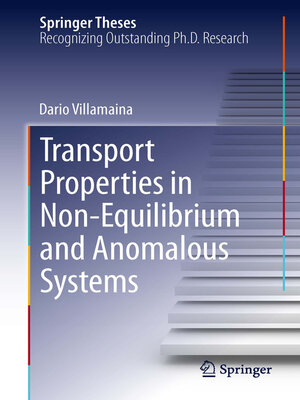Transport Properties in Non-Equilibrium and Anomalous Systems
ebook ∣ Springer Theses
By Dario Villamaina

Sign up to save your library
With an OverDrive account, you can save your favorite libraries for at-a-glance information about availability. Find out more about OverDrive accounts.
Find this title in Libby, the library reading app by OverDrive.



Search for a digital library with this title
Title found at these libraries:
| Library Name | Distance |
|---|---|
| Loading... |
The study of fluctuations in statistical physics has a long history, and a general theory is well established, connecting fluctuations to response properties of equilibrium systems. Remarkably, this framework fails as soon as some current is flowing across the system, driving it out of equilibrium.
The presence of currents is quite common in nature and produces rich phenomena which are far from being included in a general framework. This thesis focuses on this general problem by studying different models such as granular materials and systems exhibiting anomalous diffusion and shows how the generalized response techniques can be successfully used to catch the relevant degrees of freedom that drive the systems out of equilibrium.
This study paves the way to the use of the generalized fluctuation relations in an operative way, in order to extract information from a non-equilibrium system and to build the corresponding phenomenological theory.
The presence of currents is quite common in nature and produces rich phenomena which are far from being included in a general framework. This thesis focuses on this general problem by studying different models such as granular materials and systems exhibiting anomalous diffusion and shows how the generalized response techniques can be successfully used to catch the relevant degrees of freedom that drive the systems out of equilibrium.
This study paves the way to the use of the generalized fluctuation relations in an operative way, in order to extract information from a non-equilibrium system and to build the corresponding phenomenological theory.







